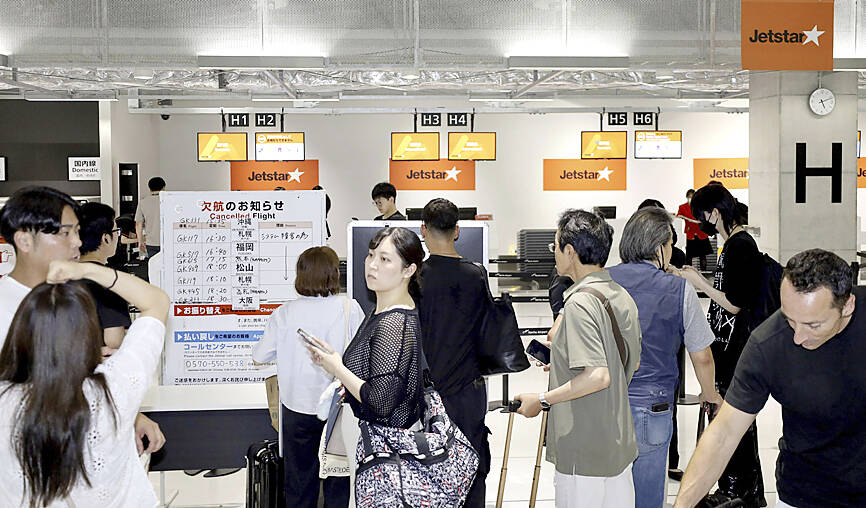Japan is to launch a new program to expedite entry procedures for Taiwanese starting from January next year.
The Japanese government is planning to introduce new rules to shorten the time it takes foreign travelers to pass through immigration, thereby attracting more tourists to visit, Japanese public broadcaster NHK reported yesterday.
An airport preclearance program would be implemented to allow foreign travelers to finish some screenings at their departure airport’s terminals and undergo simple confirmation procedures upon arrival, it said.

Photo: AP
The program would initially be applied to travelers from Taiwan from January next year and could be extended to travelers from elsewhere depending on the situation, it said.
Visitor arrivals in Japan in the first half of this year reached a record 17.78 million, up 66 percent from last year and surpassing the last historical high of 16.63 million in 2019, Japan National Tourism Organization data showed.
Monthly visitor arrivals have exceeded 3 million for four consecutive months and reached nearly 3.14 million last month, the data showed.
South Koreans made up the largest number of foreign travelers to Japan at 4.44 million, followed by Chinese at 3.06 million, Taiwanese at 2.97 million and travelers from the US at 1.34 million, with visitors from the US 1.5 times higher than before the COVID-19 outbreak in 2019, the data showed.
Owing to the yen’s weakness, inbound visitors from Western countries continued to increase after the lifting of COVID-19 pandemic restrictions, while Chinese visitors in the first half dropped to only 68 percent of the figure during the same period in 2019, the data showed.
Visitor arrivals for the full year could hit 35 million, surpassing a record-high of 31.88 million in 2019 and placing it near the 40 million goal set by the Japanese government in 2016, Japan’s Nihon Keizai Shimbun reported.
Consumption by foreign travelers in the second quarter totaled nearly ¥2.14 trillion (US$13.6 billion), marking an all-time quarterly high, data from the Japan Tourism Agency showed.
Foreign spending in the first half totaled nearly ¥3.91 trillion and was 1.6 times higher than the same period in 2019, the data showed, with spending for the full year forecast to reach ¥8 trillion.
Meanwhile, the Japanese government is to establish countermeasures against “overtourism” — overcrowding and breaching of etiquette due to an excess of tourists — such as levying tolls at tourist sites and extra charges on foreign tourists.
The authorities should step up efforts to divert the influx of tourists from metropolitan areas like Tokyo and Kyoto to other tourist attractions, Japanese Prime Minister Fumio Kishida said at a Cabinet meeting
Kishida also told agencies to increase the production and imports of jet fuel, as foreign airlines had to cancel plans to introduce additional flights due to fuel shortages at Japanese airports.

An essay competition jointly organized by a local writing society and a publisher affiliated with the Chinese Communist Party (CCP) might have contravened the Act Governing Relations Between the People of the Taiwan Area and the Mainland Area (臺灣地區與大陸地區人民關係條例), the Mainland Affairs Council (MAC) said on Thursday. “In this case, the partner organization is clearly an agency under the CCP’s Fujian Provincial Committee,” MAC Deputy Minister and spokesperson Liang Wen-chieh (梁文傑) said at a news briefing in Taipei. “It also involves bringing Taiwanese students to China with all-expenses-paid arrangements to attend award ceremonies and camps,” Liang said. Those two “characteristics” are typically sufficient

A magnitude 5.9 earthquake that struck about 33km off the coast of Hualien City was the "main shock" in a series of quakes in the area, with aftershocks expected over the next three days, the Central Weather Administration (CWA) said yesterday. Prior to the magnitude 5.9 quake shaking most of Taiwan at 6:53pm yesterday, six other earthquakes stronger than a magnitude of 4, starting with a magnitude 5.5 quake at 6:09pm, occurred in the area. CWA Seismological Center Director Wu Chien-fu (吳健富) confirmed that the quakes were all part of the same series and that the magnitude 5.5 temblor was

The brilliant blue waters, thick foliage and bucolic atmosphere on this seemingly idyllic archipelago deep in the Pacific Ocean belie the key role it now plays in a titanic geopolitical struggle. Palau is again on the front line as China, and the US and its allies prepare their forces in an intensifying contest for control over the Asia-Pacific region. The democratic nation of just 17,000 people hosts US-controlled airstrips and soon-to-be-completed radar installations that the US military describes as “critical” to monitoring vast swathes of water and airspace. It is also a key piece of the second island chain, a string of

The Central Weather Administration has issued a heat alert for southeastern Taiwan, warning of temperatures as high as 36°C today, while alerting some coastal areas of strong winds later in the day. Kaohsiung’s Neimen District (內門) and Pingtung County’s Neipu Township (內埔) are under an orange heat alert, which warns of temperatures as high as 36°C for three consecutive days, the CWA said, citing southwest winds. The heat would also extend to Tainan’s Nansi (楠西) and Yujing (玉井) districts, as well as Pingtung’s Gaoshu (高樹), Yanpu (鹽埔) and Majia (瑪家) townships, it said, forecasting highs of up to 36°C in those areas